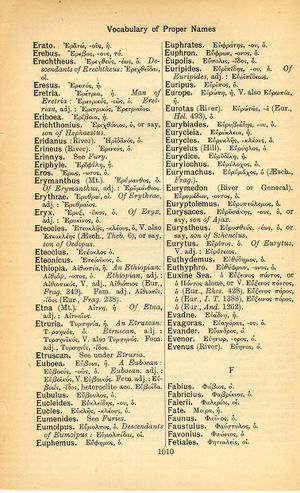Faunus
Κρεῖττον τὸ μὴ ζῆν ἐστιν ἢ ζῆν ἀθλίως → Death is better than a life of misery → Satius mori quam calamitose vivere → Der Tod ist besser als ein Leben in der Not
English > Greek (Woodhouse)
Φαῦνος, ὁ.
Latin > English (Lewis & Short)
Faunus: i, m. faveo,
I a mythic son of Picus, grandson of Saturn, and father of Latinus, king of Latium; he instituted tillage and grazing, and after death was the protecting deity of agriculture and of shepherds, and also a giver of oracles; after the introduction of the worship of Pan into Italy, he was identified with Pan, and accordingly represented, like the latter, with horns and goats' feet, Lact. 1, 24; Cic. N. D. 3, 6, 15; Verg. A. 7, 48; 81; Ov. F. 2, 193; 3, 312 sq.; Prop. 4 (5), 2, 34; id. H. 5, 138; Hor. C. 1, 4, 11; 1, 17, 2; 3, 18, 1 et saep. On account of the assimilation of Faunus to Pan, the appellation Fauni was also used for Panes, sylvan deities, Lucr. 4, 581; Ov. M. 6, 392; 1, 193; Hor. Ep. 1, 19, 4; id. A. P. 244; Enn. ap. Cic. Brut. 19, 76 (Ann. v. 222 ed. Vahl.); Cic. N. D. 2, 2, 6; id. Div. 1, 45, 101.—
II Derivv.
A Faunĭus, a, um, adj., pertaining to Faunus: versus, Victorinn. p. 2586 P.—
B ‡ Faunālĭa, ium, n., the festival celebrated on the nones of December, in honor of Faunus, acc. to Porphyr. and Acro, Hor. C. 3, 18, 1 and 10.
Latin > French (Gaffiot 2016)
Faunus,¹¹ ī, m., Faunus [dieu de la fécondité des troupeaux et des champs, confondu avec Pan : Cic. Nat. 3, 15 ; Virg. En. 7, 48 ; Ov. F. 2, 193 || v. Fauni || -nālĭa, ĭum ou ĭōrum, n., fêtes en l’honneur de Faunus : Pomp. Porphyr. Hor. O. 3, 18, 1.

